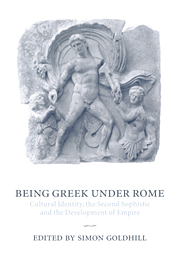Book contents
- Frontmatter
- Contents
- List of contributors
- Introduction: Setting an agenda: ‘Everything is Greece to the wise’
- 1 Subjected to Empire
- II Intellectuals on the margins
- 4 Describing Self in the language of the Other: Pseudo (?) Lucian at the temple of Hierapolis
- 5 The erotic eye: visual stimulation and cultural conflict
- 6 Visions and revisions of Homer
- III Topography and the performance of culture
- List of works cited
- Index of major passages discussed
- General index
4 - Describing Self in the language of the Other: Pseudo (?) Lucian at the temple of Hierapolis
Published online by Cambridge University Press: 22 January 2010
- Frontmatter
- Contents
- List of contributors
- Introduction: Setting an agenda: ‘Everything is Greece to the wise’
- 1 Subjected to Empire
- II Intellectuals on the margins
- 4 Describing Self in the language of the Other: Pseudo (?) Lucian at the temple of Hierapolis
- 5 The erotic eye: visual stimulation and cultural conflict
- 6 Visions and revisions of Homer
- III Topography and the performance of culture
- List of works cited
- Index of major passages discussed
- General index
Summary
Arguably, travel writing is always an act of compromise. Usually it comprises a translation of the foreign into terms acceptable or understandable to a home community, by an author whose own identity can hardly be disentangled from the act of writing. The foreign is always transformed under the gaze and representations of its interpreter (framed as a specimen, perhaps, or disunited from the cultural coordinates which give it indigenous meaning, or actively misinterpreted and abused). Yet its entry into a home culture (even the very possibility for that entry through some form of ethnographic or relativizing discourse) may transform that home culture too – nuancing both a collective cultural identity and the more personal sense of self of the traveller. When such travel becomes inextricable from the problems of religion and the very powerful effects which religion exercises on subjectivity (as in the case of pilgrimage accounts), the problems and negotiations of the self may become more complex still Ultimately, everything may be at stake in such a text; which is what makes the study of pilgrimage so rewarding.
Antiquity hardly offers us a more remarkable and intricate investigation of these problems than the de dea Syria, an account of pilgrimage to a temple in the holy city of Hierapolis in Syria, which survives in the corpus of Lucian. Whether or not the text is actually by Lucian is a subject on which a great deal of critical ink has been spilled in the last couple of centuries.
- Type
- Chapter
- Information
- Being Greek under RomeCultural Identity, the Second Sophistic and the Development of Empire, pp. 123 - 153Publisher: Cambridge University PressPrint publication year: 2001
- 25
- Cited by



